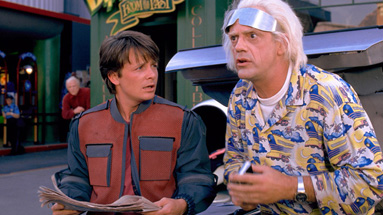Chapter Two: Back to the Future Part II
By Brett Beach
July 29, 2009
BTTFII's complicated and not as audience-friendly strategy is to replace the pleasant nostalgic shock of present-meets-past from the first film with a combination future shock/nostalgia for the present (the 1980s as a decade). This occurs by pushing the action 30 years into the future (2015) at the film's start and then setting a good portion of the action in that time frame in an ‘80s-themed diner, which seemed odd even back then. Viewing the stuttering Max Headroom-esque video celebrities (Reagan, the late Michael Jackson Jackson, the Ayatollah) taking food orders via television screen is simply bizarre 20 years later. It's fascinating to me to look at what was being pushed as nostalgia for the decade before it had even properly finished.
If Marty was the key character of the first film and Part III allows Doc to take center stage and enjoy a little romance, then it must be said that Biff is the star of BTTFII, which in and of itself explains a lot about the darker tone and more violent nature. This time around, in regards to the film's perspective, I am reminded of Tom Stoppard viewing Hamlet through the eyes of Rosencrantz and Guildenstern, or at the very least, The Lion King saga being filtered through the prisms of Timon and Pumbaa. Biff is the instigator of the action this time, pushing the plot into motion, and some version of him is present in most of the scenes. This is also affirmed by the fact that Thomas Wilson plays as many roles in the film (four) as does Michael J. Fox, although not, thankfully, having to pull off a female version of or sister to Biff. Wilson is the underrated linchpin of the series and his portrayal of elderly Biff here is, dare I say it, touching?
To me, the unacknowledged joke of the series is that for all Doc's nattering about how Marty shouldn't use the time machine for financial gain (the alternate 1985 created by Biff is supposedly a testimony to the corrupting power of using time travel to profit and creates a vision of high-towered opulence overlooking ghetto squalor that feels like social satire a la George Romero), Marty's altering of events in the first film certainly changed things in his and the McFly's family favor, financially speaking. Thus, when Doc sets out explaining to Marty how they must once again return to 1955 to stop Biff from giving himself the sports almanac, it is never suggested "fixing" what Marty screwed up in the first film, and life going back to how it once was. An interesting moral dilemma to ponder.
After one-third 2015 and one-third hellish Biff-ruled 1985, the last half of BTTFII is set in 1955 back on the same day on which the first film ended. This for me is where the dizzying logic of time travel and paradoxes - which is probably my most favorite aspect of science fiction - makes me the giddiest even as the film strip-mines BTTF to give us events overlapping events. With two sets of Docs and Martys running around town - the newer ones taking great pains not to bump into their counterparts - we are presented with a lot of the same footage or recreated climatic moments from the first film, but with the added perspective of another Marty or Doc. Why, it's almost a meta commentary on the process of a sequel going back to the well to give an audience just what they loved about the first film. Zemeckis and Gale do that and but in spades. BTTFII builds to at least three different climaxes and then of course, ends with its kicker of a cliffhanger.
Anticipation may have been high for Back to the Future Part II and it did end up performing reasonably well by comparison - earning $118 million or well over 50% of BTTF — but by the time the third installment came along in May of 1990, another large chunk of audience had fallen by the wayside and the result was $81 domestic total. It's not hard to discern from that trajectory that the poor word-of-mouth from the middle chapter stopped many from taking a chance on even what was billed as and has remained (knock on wood) the conclusion.
I remain curious as to whether at some point in his post-Gump travellings, Zemeckis will get the itch to angle for something with a little more venom and bite, something that just might take the chance on alienating audiences again. Not a good business model, I understand, but hey, Death Becomes Her 2 has possibility. No?
Continued:
1
2
3
|
|
|
|




